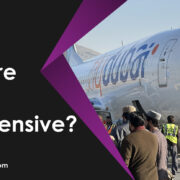Have you faced difficulty finding the best fares by air traveling? Want to know the reason why are flights so expensive these days? Various factors can impact the airfares from time to time, or this process will depend on your booking or destination. Travelers with continuous experience of moving through airlines are well known for the best times for good-fares flights.
The International Air Transport Association has announced that it will control the junk fees or extra fares, which are still charged to ticket prices. Experts like Ryan Ewing, organizer of AirlineGeeks, and Anton Radchenko, the Chief Executive Officer of Airadvisor, talk about the factors that make flights more expensive.
In this blog, we will inform you about the factors that may impact your domestic and international travel expenses. By understanding these factors that influence airfares, you can plan for a better option instead of this. These explanations save you time when it comes to reliable flight ticket sources and enhance your traveling experience.
Table of Contents
Why Are Flights So Expensive?
Flights are expensive due to several factors. Fuel costs are a significant contributor, often fluctuating and affecting ticket prices. Airlines also face high operational expenses, including maintenance, salaries, and airport fees. Demand plays a significant role, with peak travel seasons driving prices up.
Additionally, the limited number of seats and competition among airlines can lead to higher fares—economic conditions, such as inflation and currency exchange rates, further influence ticket prices. Finally, airlines use dynamic pricing models, adjusting fares based on real-time demand, which can result in significant price variations.
Which Factors Affecting Flight Prices
The increasing cost of flights in 2024 is the face of the storm due to various factors, including the current economic conditions, cold proxies, and other reasons worldwide, which are the main reasons for increasing airfare prices. There are various factors described below that are the main reasons behind expensive flight operations and their fairs.
Price of Oil
Jet fuel prices are surging daily, which is an alarming factor for airlines considering the huge expenditures after the labor expenses. From the early days of the pandemic, a significant increase in the cost of fuel has been observed. This may be due to political uncertainty over the Ukraine war. In early 2021, the cost of oil was around $65 per barrels, which has increased to $100 per barrel this past year.
Aircraft Supply
One major issue is that the airlines do not produce new aircraft assemblies quickly. According to the famous Road Warrior website View from the Wing founder Gray Leff, most of the airlines have grounded the older planes during the recent pandemic while they are going to order new and more fuel-efficient planes for their inventory.
However, manufacturers like Airbus and Boeing have difficulty producing and delivering new aircraft in bulk quantities to airline operators. One of the main reasons behind this shortage is the supply chain problems manufacturers face nowadays.
Shortage of Staff
The staff shortage is another big concern for airlines facing this issue from the Covid-19 pandemic. Now, they are facing similar conditions before the Covid as many travelers worldwide choose to travel through many airlines. They are still facing a shortage issue of crew and supporting staff, which is the reason behind airlines’ reduced schedule and over-pricing of airfares.
On the other side, many people worldwide are interested in traveling through airlines domestically and internationally, which may surpass the airline’s actual ability to control or manage flight operations. As a result, large-scale backup is required.
Type of Flights
During the flight booking process, travelers must experience the different types of flight planes across different destinations worldwide, which are divided into different categories such as direct flights, connecting flights, and non-stop flights towards the destination of passengers.
Direct Flights: Direct flights lead to the destination with only one or more stops during the flight; thus, no plane changes happen in this type of flight operation.
Connecting Flights: The connecting flight is a special flight operation expected to fly with one or different airline operators by changing aircraft at multiple stops during the flight operation or before reaching the passenger’s final destination.
Non-Stop Flights: One more efficient and relaxed way to reach the destination is non-stop flights with a very low chance of stopping, except for emergency landings.
Adjusting time is a good factor, and arranging a convenient time for you is a simple and good way to choose your transportation modes. Air travel is more reliable and time efficient but more expensive than driving.
Air traveling has different types of flights arranged into flying hours and waiting times, and different steps are taken. The passenger has a faster and hassle-free journey by choosing the non-stop flights, which are more expensive than others.
Soaring Demands
The demand for aerial traveling has soared, especially after the expanded lockdowns imposed on international levels during the COVID-19 pandemic. In 2022, authorities noted a disruption in airports while handling flight operations, which caused major delays in flight operations and cancellations due to the shortage of airline staff and increased traveling needs of passengers.
The shortage of staff results from sacking the old staff and changing the career policies during the pandemic. Furthermore, the lack of experienced and corporative staff in the aviation industry and the slow hiring process of new talents have led to the shortage problem. With the rising demand for traveling and low seating capacity among air carriers, flight ticket prices are rising.
Inflation
Inflation significantly impacts the cost of flights, making air travel more expensive for consumers. As inflation rises, the cost of goods and services increases. For airlines, this means higher expenses for fuel, aircraft maintenance, salaries, and airport fees. These increased operational costs are often passed on to passengers through higher ticket prices.
Moreover, inflation affects the currency’s purchasing power, leading to weaker exchange rates. This can make international travel more costly as airlines adjust prices to maintain profitability. Additionally, economic uncertainty caused by inflation can reduce consumer spending, prompting airlines to raise prices to cover fixed costs and maintain profit margins.
Inflation also influences demand. As prices rise, fewer people can afford to fly, leading to decreased competition among airlines and less incentive to offer lower fares. This combination of higher operational costs and reduced competition results in expensive flights.
Dynamic Pricing
Dynamic pricing strategies play a crucial role in the high cost of flights. Airlines use sophisticated algorithms to adjust ticket prices based on real-time demand, competition, booking timing, and browsing history. Prices increase sharply when demand is high, or flights are nearly full.
Conversely, prices may drop if seats are still available close to departure. This flexible pricing model maximizes airline revenue but often leads to fluctuating and sometimes excessively high consumer fares. Due to this dynamic pricing approach, travelers booking at the last minute or during peak travel typically face the steepest prices.
Airline Taxes and Fees
When you buy an airline ticket online, you might notice that the actual fare is very affordable, but sometimes, the additional taxes and fees double the cost. Two types of taxes are added to your tickets: the tax imposed by the government and the career-imposed tax.
In the U.S., the government imposed taxes like a passenger fee of $5.60, added to the 11 September security fee or air transportation tax, federal duty, and facility charges. These tax amounts can vary according to your selected airport, whether you are starting a journey for domestic or international routes.
The domestic flight through Delta Airlines indicates the main cabin cost with additional taxes.
| Taxes and Fares | Amount of Taxes and Fares |
| Base Fare | $337.67 |
| U.S. Transportation Tax | $25.33 |
| U.S. Passenger Facility Charges | $4.50 |
| U.S. Flight Segment Tax Domestic | $5.00 |
| U.S. Passenger Civil Aviation Security Service Fee | $5.60 |
With the main cabin costs and other charges, the international flight from New York City to London on Delta Airlines is imposed with actual airfare.
| Taxes and Fares | Amount of Taxes and Fares |
| Base Fare | $338 |
| Carrier-imposed international surcharge | $245 |
| Passenger Civil Aviation Security Service Fee | $5.60 |
| International Departure Tax | $44.40 |
| Passenger Facility Charge | $4.50 |
| APHIS Passenger Fee | $3.83 |
| Passenger Service Charge Departures | $60.80 |
| Customs User Fee | $6.97 |
| Immigration User Fee | $7.00 |
| Air Passenger Duty | $109.50 |
How to Save Money on Airline Tickets
According to the current situation, traveling the world without breaking any barriers or going out of budget is challenging. But you must not give up at all! You can still make a wonderful holiday trip with the right plans and strategies to stay within your budget. All is possible when you will not drop your goals and plans.
Choose Budget Airlines
Opting for budget airlines can significantly reduce travel expenses. These carriers often offer lower fares by cutting out non-essential services, such as in-flight meals and extra legroom. While the overall experience may be more basic, the cost savings can be substantial. For cost-conscious travelers, choosing budget airlines is an effective strategy to combat the rising costs of flights and make air travel more affordable.
Using a Travel Agent
Utilizing a travel agent can help mitigate the high cost of flights. Travel agents have access to exclusive deals, bulk discounts, and insider knowledge that can lead to significant savings. They can also navigate complex booking systems and find the best routes, often securing better prices than online ones. A travel agent’s expertise can be invaluable for travelers looking to save money.
Considering an Alternative Airport
Choosing an alternative airport can be a smart strategy to avoid high flight costs. Major airports often have higher fees, more traffic, and greater demand, increasing ticket prices. Smaller regional airports typically offer lower fares due to reduced operating costs and less blocking. Travelers can save money by flying into or out of these less busy airports.
Additionally, nearby airports might offer better deals and more flexible scheduling. Though it may require a longer drive or additional ground transportation, the overall savings can make considering alternative airports a worthwhile option for budget-conscious travelers.
Choose Flexible Time
Selecting flexible travel times can significantly lower flight expenses. Flights during off-peak hours, such as early mornings or late nights, are often cheaper. For example, a flight departing at 6 AM might cost less than at 10 AM.
Additionally, traveling mid-week, like on Tuesdays or Wednesdays, usually offers lower fares than weekends. Being open to flying on less popular dates and times helps avoid the higher costs associated with peak travel periods. Flexibility in timing can lead to substantial savings, making air travel more affordable.
Consider Traveling Abroad
Traveling abroad can sometimes be more cost-effective than domestic flights, especially to countries with lower living costs. Destinations like Thailand, Vietnam, and Mexico often offer cheaper flights and travel expenses. These countries provide affordable accommodation, food, and activities, lowering the total trip cost despite the long-distance flight.
Additionally, international airlines frequently run promotions and offer competitive fares to attract travelers. By considering international travel to budget-friendly countries, you can enjoy an enriching travel experience while managing expenses more effectively.
Redeem Points and Miles
Redeeming points and miles can significantly reduce flight expenses. Frequent flyer programs and credit cards offer miles for every dollar spent, which can accumulate quickly. For example, redeeming 25,000 miles might cover a $500 domestic flight. Some credit cards offer sign-up bonuses, like 50,000 miles, after spending $3,000 in the first three months.
These rewards can lead to substantial flight savings, making even expensive trips more affordable. Regularly checking for promotions and planning can maximize the benefits of points and miles, lowering the overall cost of air travel.
Compare for the Best Deals
Comparing flight prices across multiple platforms can help find the best deals and save money. Websites like Skyscanner, Kayak, and Google Flights allow you to compare prices from various airlines and booking sites.
Using comparison tools helps identify the most affordable option. Additionally, setting up fare alerts ensures you are notified of price drops and special deals. Consistently comparing prices can lead to significant savings on flight costs.
| Domestic Flight from New York City to Los Angeles | Airline | Price |
| American Airline | $300 | |
| Delta Airline | $280 | |
| United Airline | $320 |
Why Are First Class Flights So Expensive?
First-class flights command high prices primarily due to their luxurious amenities and services. These include spacious seats that convert into beds, gourmet dining, dedicated flight attendants, exclusive lounges, and priority boarding. Airlines restrict the number of first-class seats, maintaining exclusivity and ensuring personalized service.
Moreover, the cost covers premium materials, advanced entertainment systems, and enhanced privacy. Airlines target high-income travelers willing to pay for superior comfort and convenience. The scarcity of first-class seats and the high demand for luxury travel contribute to the steep prices, making first class a luxurious but expensive option for air travelers.
Why Rising Average Fares Don’t Matter?
Rising average fares may not impact all travelers equally due to various factors. Travelers who plan, use rewards programs or are flexible with travel dates can mitigate higher costs. Moreover, those prioritizing comfort and convenience may find value in premium cabins or direct flights despite higher prices.
For budget-conscious travelers, alternatives like budget airlines, travel agents, or off-peak travel times offer affordable options. Additionally, exploring less-traveled destinations or redeeming points can offset rising fares. Ultimately, while average fares may increase, savvy travelers have numerous strategies to manage and minimize the impact, ensuring air travel remains accessible and affordable.
How Can You Get Better Deals?
Here are some tips for getting better deals for your traveling plans and trips.
- Advance Planning: Book flights well in advance to secure lower fares.
- Compare Prices: Use flight comparison websites to find the best airline deals.
- Be Flexible: Travel during off-peak times or consider alternative airports for cheaper options.
- Use Rewards: Redeem airline miles or credit card points to reduce costs.
- Sign Up for Alerts: Receive notifications on fare drops and special promotions.
- Consider Package Deals: Consider bundled offers, including flights, accommodation, and activities.
- Negotiate: Sometimes, calling airlines directly or using travel agents can lead to discounts.
- Stay Updated: Follow airlines and travel websites for flash sales and last-minute deals.
Conclusion
Understanding why are flights so expensive involves considering a range of economic factors that influence airfare pricing. These elements collectively drive ticket prices upward, from explosive fuel costs and operational expenses to airline competitive dynamics. However, travelers can navigate these challenges by employing strategic approaches to find more affordable options and other plans.
Individuals can often secure better deals by using flight comparison tools, booking in advance, and being flexible with travel dates and destinations. Additionally, leveraging frequent flyer programs, monitoring for promotions, and considering alternative airports can further reduce costs.
Despite the complexities of airfare pricing, energetic planning and awareness of market trends empower travelers to make informed decisions. While some routes and times may be more expensive due to high demand or limited availability, exploring various booking strategies and remaining vigilant for discounts can lead to significant savings.
Ultimately, by understanding the underlying factors driving airfare costs, travelers can optimize their travel budgets and enjoy affordable flights tailored to their needs.








Comments